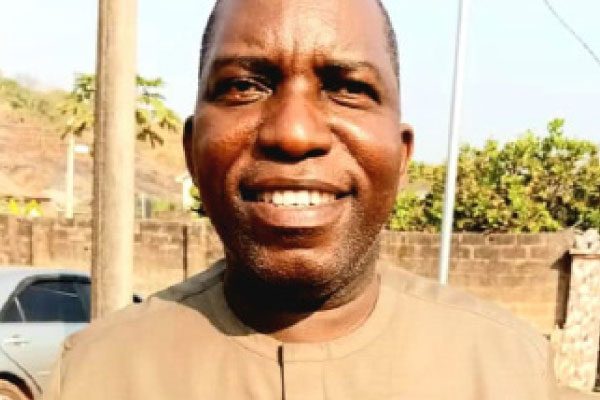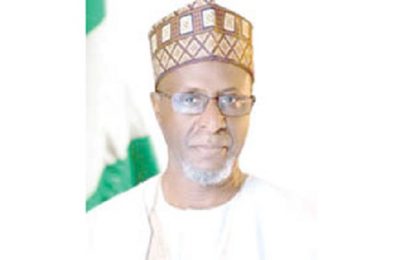Akinbamidele Akinnagbe is the Permanent Secretary, Ondo State Universal Basic Education Board and Lay President of the Methodist Church Nigeria, Diocese of Idanre. He shares his life story with TUNBOSUN OGUNDARE.
Can we have your story from the very beginning?
I was born into a polygamous family and I’m the second born of my parents. My father was a teacher and rose to become a headmaster. So, I used to be called ‘Omo Tisa’ (teacher’s son) in my community. And you know as a teacher’s son, you must be well-behaved by respecting the elders and be a good example to your peers among others. During that period, there was discipline unlike nowadays when children misbehave anyhow.

For my primary and secondary education, I attended Methodist School in Idanre, my home town in Ondo State. I was among the brilliant students in class. Nobody expected ‘Omo Tisa’ to be poor academically and that was why I was among the school prefects. I was the assistant senior prefect in my secondary school.
That background alone helped me so much when I gained admission into Obafemi Awolowo University, Ile- Ife to study Political Science between 1989 and 1994. My background encouraged me to vie for the position of student president of my department. Though I didn’t win the election, I was involved in politicking.
Is that all about growing up?

There were many other things. I used to play football just like many other male children in the community. I would go to the farm but only on Saturdays unlike most of my peers whose parents were farmers and had to go to the farm from Fridays after school hours and return home on Sundays and also during the holidays, but because my father was a teacher and disciplinarian, I was well-behaved, otherwise I would be flogged; teachers used cane to flog students during our time. That reminds me of an incident when there was general punishment for almost all of us in the class. I was excluded from the punishment just because they knew my father would flog me again at home for being punished in school. So, I knew I must prevent such double punishments.
But nowadays, parents rebuke their children’s teachers for correcting them.
That is the product of the societal decadence we are experiencing today in our society and it is a bad development. Children have to be disciplined when they do wrong. Discipline is a way of correcting them. God instructed parents not to spare the rod, but civilisation has crept in and changed the societal values and norms upside down and the negative effects are what we are all confronted with today in our society.
You did your first degree at OAU, Ile-Ife and studied Political Science. Why those choices?
Honestly, OAU wasn’t my first attempt. It was when I was doing the Advanced Level programme at the Federal School of Arts and Science, Ondo between 1988 and 1989 that the decision to attend OAU was taken. It happened that I had the opportunity to visit some universities, especially in the South-West including the Ondo State University (now University of Ado- Ekiti), OAU and some others. I was stunned the day I visited OAU. I was so excited about the visit. I had not been to such a school environment before; the beauty of the campus. The infrastructural layout and all that impressed me. I was also moved to see young boys and girls as students. I said to myself ‘I must attend OAU’ and my desire came to pass.
The choice of political science was a deliberate one. I had wanted to become somebody, who would manage people right from my tender age. I just love to be a public administrator. Maybe, I would have studied Public Administration but OAU didn’t offer the course at the undergraduate level at that period and, I think, even till now. That was the simple reason I can give and I thank God I didn’t regret it.
Who motivated you to think in that direction?
Honestly, I can’t remember if I had any. You know when we were in secondary school, we used to have career talks about what we wanted to become in future. When others mentioned their desires to be future lawyers, medical doctors, engineers, accountants and so forth, I would just mention administrators and everybody would laugh.
How was Ife of your time?
I didn’t have any experience beyond the normal experiences like that of every other child from a good home. I was taught to be of good behaviour anywhere I am. Don’t forget, I am ‘Omo Tisa’ who must live by example. So, I remained an easy-going person on campus. My job was to go to class and study.
So, it was all about studies?
No, I didn’t mean it that way. I socialised and had fun with friends, classmates and roommates but all without distraction. I must also say I was involved in campus politics. I contested to be student leader of my department as I had earlier said and I didn’t win the election, but I closed my eyes completely to anything that could bring disgrace or disrepute to myself and my family back home.
You were once a teacher…
For a job after graduation, I prepared myself ahead during my National Youth Service Corps (NYSC) days. While serving, I applied for a teaching job and was invited for an interview. Just as I finished my service, I went to pick up my employment letter as a classroom teacher. I was teaching when I applied to the mainstream civil service and was offered employment as an Administrative Officer. I haven’t written any application letter since then and here I am today, to the glory of God.
What is your most striking moment in life?
I have many but one stands out and that was the day I was announced as a Permanent Secretary of Ondo SUBEB in 2021. It was indeed a great day for me and I felt fulfilled. You know the permanent secretary position is the pinnacle for a career civil servant. The only office beyond that is the Head of Service. So, when you think about how you moved from a middle-level cadre as an administrative officer up to the peak of your career, scaling through all the hurdles and challenges on the way, you feel fulfilled and I thank God for seeing me through. It wasn’t easy to rise to this level.
What does it cost to become a permanent secretary in the civil service?
It is simply by the effort you put in as you move up the ladder, coupled with the grace of God. You know hundreds of others may also qualify for the same position. But by God’s mercy, I was found suitable for the position. It gladdened my heart.
What would be considered a major regret in life?
I don’t think I have any regrets so to say, either on the job or at home. Even if I make a decision and it doesn’t work out, I move on; that is me, but there was an incident that happened that I still feel sad about whenever it comes to mind. That was the demise of my elder brother in 2009. He was like a backbone for me. He was based in Idanre and always stood for us in the family. He used to represent us at any level. Since his demise, most of those roles naturally fall on me.
How did love find you?
I can only say our coming together was by destiny. You know the Bible says whoever finds a wife finds a good thing and obtains favour of the Lord. My wife, Funke Akannaigbe, is God-given to me. She is from Akure while I’m from Idanre. We speak the same language and she is also from a Christian home. So, we have many things in common. I met her and we started talking when I relocated to Akure to take up a civil service job. In the process, I proposed to marry her and since I was already thinking about marriage, we introduced ourselves to our parents for their consent. There was no serious objection to our proposal, but then, some people in her family thought that since I was about 30 years old then and had a job, I might be deceiving her. They thought I would likely have another lady in mind to marry back at home.
How did you respond to the skepticism?
I only assured them that there was nothing like that and when they saw my seriousness and commitment, nobody had such feelings again. That was how we got married after about three years in courtship. And we thank God for giving us a happy home and blessing us with wonderful children.
What is your view about life?
Life is sweet and full of ups and downs. Things may be rosy at times and at other times, it may turn the other way. Irrespective of where things turn to, we should do our own bit and make an impact on people’s lives and the society.
You are a chief, is your title traditional in nature?
It is not traditional but an honorary title in the church. It is for members who have contributed in a way to the growth and development of the church and the welfare of members. I’m ‘Ajiware Okunrin Ijo’ of Methodist Church Cathedral, Akure.
Who were your mates in school and are you still in touch with them?
There were many of them from my primary school days to university and I am still in touch with many of them. You know alumni associations bring old school mates together and I am a very active member of Methodist School Idanre Old Student Association as well as the ‘93 Pol Science Alumni Association, OAU Ile-Ife. We do meet from time to time to help ourselves and give back to our alma maters in any way we can.
YOU SHOULD NOT MISS THESE HEADLINES FROM NIGERIAN TRIBUNE
FULL LIST: 45 visa-free countries Nigerian passport can travel in 2024
Nigeria sits behind Ghana, Guinea, Kenya, Lesotho, Morocco, Benin Republic and Namibia which are at…
How my brother and I became professor same day in same varsity —UNILORIN don
Recently, two brothers –Ahmed Oloduowo Ameen and Mubarak Oloduowo Ameen– were promoted to…
‘I expected N2,000 as my share from sale of human head we got at Saki cemetery’
Thirty-two-year-old Alli and Abdullahi, aged 35, who were the two suspects arrested by…
Why Port Harcourt refinery is yet to start production—Soneye, NNPCL Chief Comm Officer
Mr Femi Soneye is the Chief Corporate Communications Officer (CCCO) of the…
Fear women, fair women and Minister Ojo
Betta Edu, Sadiya Umar-Farouq and Halima Shehu are the reigning women in our…
What you should know about players in Nigerian 2024 AFCON team
The Nigerian football team have appeared in the finals of the Africa Cup of Nations on twenty different occasions. Nigeria has…







